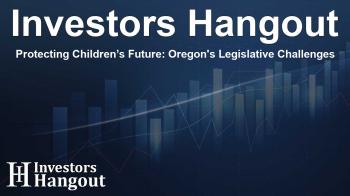Protecting Children’s Future: Oregon's Legislative Challenges

Oregon's Commitment to Early Childhood Education
As the Oregon State Legislature wraps up its latest session, significant conversations around early childhood education are taking center stage. The Children's Funding Project has expressed relief over the recent defense of the Preschool for All program, which aims to provide valuable early education to children across the state. There's a shared anticipation for the impact of this program, which was overwhelmingly approved by voters in a prior election.
Understanding Preschool for All
Established by Oregon voters, Preschool for All is designed to ensure that every child receives access to quality pre-K education. The program received tremendous support, with 64% of voters advocating for a tax initiative that targets high-income earners to fund this essential service. The program is set to serve around 11,000 children each year, making a profound difference in their developmental opportunities and readiness for school.
Legislative Amendments and Public Advocacy
Amidst ongoing discussions in the legislature, a controversial amendment was introduced, which threatened to dismantle the Preschool for All initiative. This proposal aimed to cut funding and shut down the program, directly impacting thousands of families reliant on affordable preschool education. Public response was swift, with over 50,000 supporters sending letters advocating for the program's continuation, which prompted state legislators to reconsider the amendment.
The Role of Leadership and Public Trust
The ongoing discourse around early childhood education reflects a broader issue of governance and the public's trust in elected officials. Concerns have been raised about leaders misrepresenting facts surrounding important initiatives such as Preschool for All. Critics, including Elizabeth Gaines, CEO of Children's Funding Project, argue that this situation reflects a troubling trend where governing bodies operate contrary to the expressed will of the voters, potentially endangering democratic processes.
Comparative Situations Across the Nation
Children's Funding Project is not alone in witnessing this trend. Similar situations have unfolded in other regions, such as Platte County, where residents are challenging local officials over the implementation of a sales tax meant to support children's mental health services. These cases highlight a concerning pattern of government officials ignoring the electorate's decisions, which undermines democracy and can be detrimental to community well-being.
Looking Forward
Even though the immediate crisis surrounding Preschool for All has been averted, advocates stress the need for ongoing vigilance. Ensuring that voter-approved initiatives remain intact requires consistent effort and advocacy. Organizations like Children's Funding Project are crucial in pushing back against those who seek to reverse progress made in public education and child services.
Your Role in Advocacy
Children’s Funding Project encourages individuals to continue standing up for educational protections. It is essential to voice opinions to elected officials and advocate for the preservation of programs that ensure equitable access to education for all children. Interested parties can actively participate through campaigns supporting Preschool for All and similar initiatives.
Frequently Asked Questions
What is Preschool for All?
Preschool for All is a program initiated in Oregon to provide universal pre-kindergarten education funded through a tax increase on high-income individuals.
Why was the amendment proposed?
The amendment aimed to eliminate funding for the Preschool for All program, which would have negatively impacted thousands of families relying on early childhood education services.
How can the public support early childhood education?
Public support can be shown by advocating for education initiatives, communicating with elected officials, and participating in local campaigns focused on child welfare.
What are the long-term goals of the Children's Funding Project?
The long-term goals include expanding equitable opportunities for children through strategic public financing and advocating for voter-approved programs.
What lessons can be learned from this situation in Oregon?
This situation underscores the importance of public engagement in governance and the necessity of holding elected officials accountable to the decisions made by voters.
About The Author
Contact Hannah Lewis privately here. Or send an email with ATTN: Hannah Lewis as the subject to contact@investorshangout.com.
About Investors Hangout
Investors Hangout is a leading online stock forum for financial discussion and learning, offering a wide range of free tools and resources. It draws in traders of all levels, who exchange market knowledge, investigate trading tactics, and keep an eye on industry developments in real time. Featuring financial articles, stock message boards, quotes, charts, company profiles, and live news updates. Through cooperative learning and a wealth of informational resources, it helps users from novices creating their first portfolios to experts honing their techniques. Join Investors Hangout today: https://investorshangout.com/
The content of this article is based on factual, publicly available information and does not represent legal, financial, or investment advice. Investors Hangout does not offer financial advice, and the author is not a licensed financial advisor. Consult a qualified advisor before making any financial or investment decisions based on this article. This article should not be considered advice to purchase, sell, or hold any securities or other investments. If any of the material provided here is inaccurate, please contact us for corrections.

